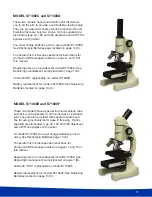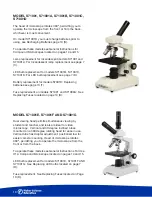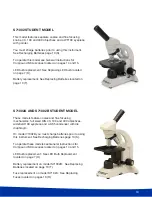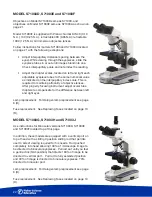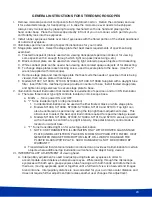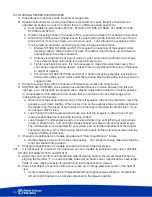
10
exposing top lens housing.
b. Remove top lamp lens housing by grasping it and rotating in a counter-clockwise direction
to expose the lamp.
c.
Remove light bulb by firmly grasping and pulling straight out from bi-pin socket.
d.
Using Fisher Science Education replacement lamp no S74025 (12volt 15watt Halogen
bi-pin base) hold lamp with tissue paper, orientate the two pins with the socket and firmly
push into socket. Wipe bulb to insure that it is clean and free of all fingerprints.
e. Replace top lens housing by rotating in a clock-wise direction until tight.
f. Replace top lampshade by rotating in a clock-wise direction until tight.
Q.
Replacing the Incidental (Top) Lamp on College Stereo Model S71010:
a. Remove top lampshade by grasping it and rotating in a counter clockwise direction
exposing halogen reflector lamp.
b.
Remove light bulb by firmly grasping and pulling straight out from bi-pin socket.
c.
Using Fisher Science Education replacement lamp no S74026 (12volt 10watt Halogen
Reflector) orientate the two pins with the socket and firmly push pins into socket.
d. Replace top lens housing by rotating in a clock-wise direction until tight.
R.
Replacing Fuses on Models Requiring a Fuse:
a. Fuse is located at the rear side of microscope base.
b. To remove fuse from holder, insert a 6mm screwdriver blade into slot located in rear of
fuse holder cap. Slightly depress and rotate screwdriver ¼ turn in direction of arrow,
release pressure on screwdriver to release fuse.
c. Pull cap and fuse out of fuse holder.
d. Insert proper fuse into fuse cap. Insert fuse cap into fuse holder.
e.
Using screwdriver, rotate fuse cap assembly in opposite direction of arrow until slot
engages, depress fuse cap and rotate ¼ turn to lock into fuse holder.
S.
Recharging Batteries on Cordless Models:
a.
Must use the supplied Automatic Switching Recharger when charging batteries.
b. It is recommended that you charge the batteries before initial use and after prolonged
storage as the batteries may have discharged.
c. Plug output cord from battery charger into DC recharging socket located on LED
illuminator. Your automatic switching recharger operates on 100 to 240 volts AC 50/60
Hz. Plug recharger into your AC wall outlet.
d.
Battery recharger is also equipped with an automatic “trickle charge” feature; the red
LED indicator lamp located on recharger will be illuminated when batteries are receiving
maximum charge. After batteries are charged, the red LED indicator lamp will turn to
green and charger automatically switches to “trickle charge”.
e. The charger can be left plugged in, but for safety reasons it is a good idea to disconnect
the charger from the AC wall outlet and the output cord from recharging socket after 12
hours. Batteries and charger may feel warm when charging, and unplugging the recharger
is a safety precaution.
T.
Replacing Batteries on All Rechargeable LED Microscopes, except Models S71000C and
S71000F:
a.
Gently lay microscope on its side. Remove the rubber feet located on bottom of base
and remove base plate. Observe battery compartment inside of illuminator base.
b. Remove the screw securing battery cover to bottom of illuminator. Slide cover back
to expose and remove batteries. Remove “ALL” 3 batteries and replace with new
rechargeable AA nickel hydride batteries, insert with correct polarity according to
markings on battery holder.
c. Replace battery cover and secure screw.
d. Replace base plate and the rubber feet.
e.
Recharge batteries as described in Care and Maintenance of Microscopes located on
page 10 (S).

















